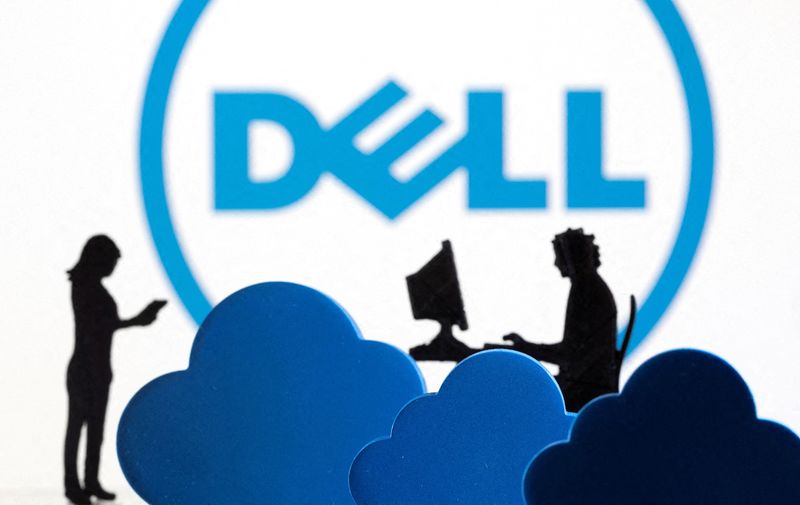(Reuters) -Dell on Tuesday nearly doubled its annual profit growth target for the next four years, betting on robust demand for its servers that power artificial intelligence workloads.
The company, whose customers include Elon Musk‘s AI startup xAI and CoreWeave, lifted its expectations for annual growth in adjusted earnings per share to at least 15% from around 8%.
Its shares surged nearly 3% in early trading after the company also said it expects compounded annual revenue growth between 7% and 9% for the next four years, up from its prior view of 3% to 4%.
Insatiable demand for servers that provide the computing power needed to run services such as ChatGPT has turned Dell into one of the biggest winners of the generative AI boom.
Its strong profit growth expectation may also ease investor concerns about the margin hit from competition in AI servers and the high costs of building the products.
Dell also reiterated its third-quarter and annual forecasts. It had raised its expectation for AI server shipments in August to $20 billion for fiscal 2026.
“Customers are hungry for AI and the compute, storage and networking we provide to deploy intelligence at scale,” CEO Michael Dell said, adding that the company was in the early stages of AI adoption despite two years of progress.
Dell expects long-term compounded annual revenue growth of 11% to 14% for the infrastructure solutions group – home to its storage, software and server offerings. That compares with its earlier expectations of 6% to 8%.
The company continues to expect revenue growth of 2% to 3% for its client solutions group, which includes personal computers. Strong competition in the consumer market has hit the business in recent years, even as Dell keeps a strong position among enterprise clients.
The company is expected to benefit from a PC refresh cycle after Microsoft ends support for Windows 10 next week, as users and companies seek to maintain security and access to the latest features.
(Reporting by Jaspreet Singh in Bengaluru; Editing by Arun Koyyur)
(Reuters) -Dell on Tuesday nearly doubled its annual profit growth target for the next four years, betting on robust demand for its servers that power artificial intelligence workloads.
The company, whose customers include Elon Musk‘s AI startup xAI and CoreWeave, lifted its expectations for annual growth in adjusted earnings per share to at least 15% from around 8%.
Its shares surged nearly 3% in early trading after the company also said it expects compounded annual revenue growth between 7% and 9% for the next four years, up from its prior view of 3% to 4%.
Insatiable demand for servers that provide the computing power needed to run services such as ChatGPT has turned Dell into one of the biggest winners of the generative AI boom.
Its strong profit growth expectation may also ease investor concerns about the margin hit from competition in AI servers and the high costs of building the products.
Dell also reiterated its third-quarter and annual forecasts. It had raised its expectation for AI server shipments in August to $20 billion for fiscal 2026.
“Customers are hungry for AI and the compute, storage and networking we provide to deploy intelligence at scale,” CEO Michael Dell said, adding that the company was in the early stages of AI adoption despite two years of progress.
Dell expects long-term compounded annual revenue growth of 11% to 14% for the infrastructure solutions group – home to its storage, software and server offerings. That compares with its earlier expectations of 6% to 8%.
The company continues to expect revenue growth of 2% to 3% for its client solutions group, which includes personal computers. Strong competition in the consumer market has hit the business in recent years, even as Dell keeps a strong position among enterprise clients.
The company is expected to benefit from a PC refresh cycle after Microsoft ends support for Windows 10 next week, as users and companies seek to maintain security and access to the latest features.
(Reporting by Jaspreet Singh in Bengaluru; Editing by Arun Koyyur)

